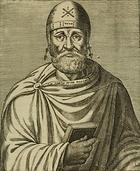
Philo of Alexandria ( Greek Φίλων ὁ Ἀλεξανδρεύς , . Alexandria, 15/10 BC - Alexandria , 45/ 50) , also called Philo the Jew, is one of the most renowned philosophers of Hellenistic Judaism . Little is known about the life of Philo and , in general, most of the biographical data come from his own work , especially his autobiographical Legatio ad Caium (Embassy to Gaius ) and book Jewish Antiquities , Josephus . The only fact of his biography which can be dated with certainty is his speech at the embassy that the Alexandrian Jews sent to the Roman Emperor Caligula to seek his protection against the attacks of the Greek city , and to beg him not claim to be honored as a god for the Jews. This took place in the year 40 . The exact dates of his birth and his death are not known.
The thought of Philo reconcile Greek philosophy and Judaism , which seeks to harmonize with the allegorical method, which takes both the Jewish exegetical tradition and the Stoic philosophy . His work was not widely accepted nor between the Jews and the Greeks . However, it was received with enthusiasm by the early Christians, who came to have him as one of their own . Eusebius came to believe that Therapeutae , a group of Jewish ascetic life of hermits who lived in the Egyptian desert that Philo describes in De vita contemplative , were actually a Christian sect . In the XIX s falsity of the work was questioned. After demonstrating that it is authentic , the question of what religion belonged to these communities , resolved affirming its connection with Christian monasticism deny or question of monastic life. Others argue that monasteries were Pythagoreans .





